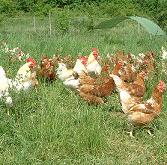‘Animal compassionate’ meat available soon

The Whole Foods Market, with stores in the US, Canada and the UK, is preparing to roll out a line of meat labelled ‘animal compassionate’, which will flag to consumers that the animals were raised in a humane manner.
The Whole Foods Market, which funded the development of the Animal Compassion Foundation, has opted to introduce the new labels as a growing number of retailers are making similar animal-welfare claims on meat and egg packaging,
While labels including ‘free farmed’, ‘certified humane’, ‘cage free’, and ‘free range’ are becoming commonplace, it remains unclear whether they appeal to a broad market. Consumers must pay up to twice as much for these products.
Ted Taft, marketing director of the Meridian Consulting Group says that consumers are prepared to pay more for free range chicken because it makes them feel good. “You could argue that chicken is chicken,†he said. “But it’s something to give [a product] an edge in a tie-breaker.â€
The increase in animal-welfare labels has been driven in part by animal-rights organisations. The Humane Society of the United States, for instance, has been lobbying to end the practice of caging laying hens.
The market for cage-free eggs, which often cost 60 percent more, is growing rapidly, though neither the US federal government nor United Egg Producers tracks their share of the market.
Whole Foods has been working on its animal compassionate standards for three years and plans to unveil its logo in a few months, as soon as auditing guidelines are established to make sure farmers are following the rules.
But some critics say all the new marketing labels will confuse consumers who are already struggling to decide between organic and antibiotic-free, grass-fed and natural.













